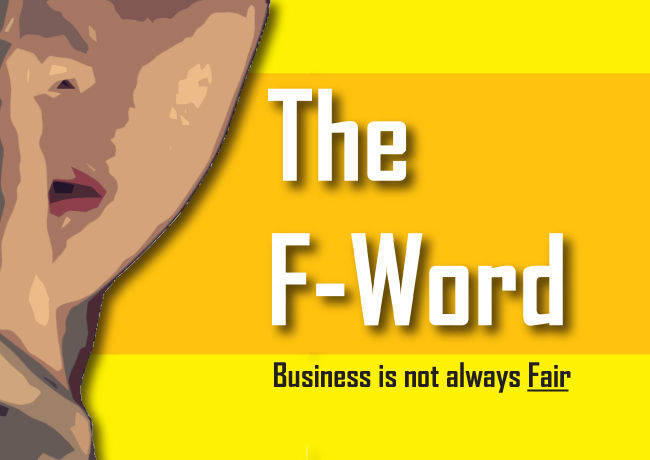When working with my clients, I refuse to let sales people use a particular foul word.
The use of the F-word shows a lack of professional understanding and a fundamental misconnect about what commerce is based on.
The four letter F-word I am referring to is
the word: F-A-I-R.
There is no such thing as fair in business and no prizes for runner up and locally, there is no concept for fair in regular Japanese business nor regular use of it's direct translation.
Now before the lingo-philes whip out their J-flash application and look up the word, I am saying that the word kouhei (fairness) or byoudou is rarely used in professional settings by business people here in Japan.
When it is used, it is by the side who feels they have no grounds to negotiate on and are in the weaker position.
Fairness is a virtue in a western Judeo-Islamic-Christian cultural paradigm. This virtue was brought to the populace by warriors to the subjugated, and from the nobility to the serfs beneath them.
Charities across the globe seek appeals on this core, western concept.
In a business scenario, fairness is something expected by the weak because without a crafted argument, counter-offer, or rebuttal they have little else to appeal on.
The Japanese do not raise their children to expect fairness or concessions by the other side. “泣き面に蜂” “A crying face gets a bee-sting,” is a common old-adage in this country.
You don’t get what is fair in life or in business, you get what you work hard for and what you ask for.
In China recently, western tycoons are trying to elicit generosity and “fairness” from Chinese billionaires for philanthropic pledges--any gut feelings on how successful these westerners will be?
Am I weak for being fair?
The proactive offering of more favorable terms to your business partner is a sign of strength and sincere compassion for their well-being and long term success.
The expectation of such treatment for yourself is a sign of weakness, period.
Fair is a word that salespeople and negotiators need to remove from their mouths with a wire-brush and strong soap.
So, we are just cutting at each other’s throat then, right?
Not at all.
As professionals, we manage expectations and trade concessions conditionally based on mutual trust and for mutual success.
If you are asking for me to go into the red on this project, then we aren't partners.
Sidenote: If someone just wants to lower prices, and cause you to go to the poorhouse, lower deliverables or ask for a concession of similar value from their side. “In terms of our agreement, a 16 percent reduction in cost would need to be reclaimed in another area of our transaction, how about you purchase 255 additional cases, to be paid for this afternoon?”
Rather than the word fair, use “challenging” or “inappropriate” when confronted by difficult requests and hard balling.
Smart Japanese use the term muzukashii or difficult, taking the brunt of a flat “no” away from their counterpart.
And yes, changing the word does mean it has a different impact. Language is a powerful tool, and as I said before, use tools but don’t be one.
Always be more professional in your demeanor and language than your counterpart. It imparts sophistication, professionalism, and class. Exposing your perceived weakness and imploring for fairness shows you are insecure in your position.
Stop whining, MAKE A COUNTER-PROPOSAL!
When attacked and undercut, the most powerful form of defense is a one-two punch combination of silence and a conditional trade offer.
Are you doing this, or just using the F-word?
Blog:
Other posts by Jason de Luca:







